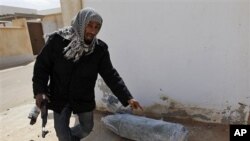U.S. officials are looking at several responses to Libya's conflict, including imposing a no-fly zone over the country.
During the past 20 years, international coalitions have imposed and enforced no-fly zones over Bosnia for two years in the mid-1990s, and over northern and southern Iraq, spanning the years 1991 to 2003. A no-fly zone is defined as airspace in which certain aircraft - especially military ones - are forbidden to fly.
Now there is talk of imposing another no-fly zone, this one over Libya. Many European countries, U.S. military planners and the Arab League are looking at the feasibility of such a move. But others, such as Russia and China, have expressed reservations.
Retired Navy Captain Tom Parker, who flew aircraft patrolling the no-fly zone over Bosnia, says before looking at a possible no-fly zone over Libya, certain key questions must be addressed.
"The first question that needs to be answered is what is the objective? Is the objective to protect the people - that’s one thing. Is the objective to overthrow Colonel Gadhafi - that’s another thing," said Parker. "Is it to provide succor [provide assistance or relief] to the rebels, whoever they are, because that is really not known - then that’s another thing. Or maybe some combination of those. So the first question would be what’s the objective? What are we trying to achieve?
Retired Air Force General David Deptula, who flew more than 80 missions enforcing the no-fly zone over Iraq, agrees.
"People seem to be offering a no-fly zone as the solution - but they haven’t defined what the problem is or what the desired effect of the imposition of a no-fly zone is," he said.
General Deptula says other questions include what are the rules of engagement? Will the no-fly zone cover all of Libya - or just over areas occupied by pro-Gadhafi forces? Who would be involved and for what length of time?
Captain Parker says once those issues are resolved, the hard work begins.
"This is where it gets to be very complicated, because you can imagine, you need multiple aircraft: you need fighter aircraft; you need tanking aircraft; you need surveillance aircraft," he said. "You’ve got to have a plan. You’ve got to be able to communicate with all the multiple aircraft that will have to be involved, you have to coordinate their activities," continued Parker. "So when you say setting up a no-fly zone, it’s certainly possible, but it is difficult. It is very, very complicated and it will be expensive and possibly dangerous because the Libyans have - at least on paper - at least 200 surface-to-air missiles, some of them very capable, older systems, particularly the Soviet SA-6."
However Peter Felstead, editor of London’s Jane’s Defense Weekly, says many of the Soviet supplied surface-to-air missiles may have fallen into disrepair.
"Pretty old equipment and not necessarily much by way of professionalism in terms of manpower behind it," said Felstead. "But of course, if there is just one surface-to-air missile that is of a decent enough range, and is active, then that does present a threat."
General Deptula says a no-fly zone is only one of several options being considered. Another one would be to locate the bases used by Libyan aircraft attacking rebel positions.
"So you find out where is that base the aircraft came from and that evening, half of that squadron of airplanes disappears under a cruise missile attack," he said. "Do you think those pilots in that squadron will want to go out and fly the next day? Probably not. That’s the kind of options that need to be considered that may be effective without a default solution of putting up hundreds of airplanes over the country to establish a no-fly zone."
Both General Deptula and Captain Parker say any military action against Libya, including the imposition of a no-fly zone must have the approval of the international community, that would give the mission its legitimacy.
They say the ideal situation would be to have a United Nations Security Council resolution backing the no-fly zone. But already two of the council's permanent members - Russia and China - say they do not approve of such a move.
Parker says he understands the thinking of some countries.
"One of the reasons you could imagine why nations are reluctant to get involved, is where does this end? When do you declare victory? When do you achieve what you’re after with a no-fly zone and what’s the measure of effectiveness? If we impose a no-fly zone, is this something that will last a week?" he said.
Or, said Parker, will it last for years as did the no-fly zones over northern and southern Iraq.
For his part, General Deptula asks - on whose behalf will the international community be acting in setting up a no-fly zone over Libya?
"Who is the authority on behalf of those who are resisting Gadhafi that are asking for this support? Who is their leader and how are we to be assured that they are not going to be as bad or worse than Gadhafi, once they are in power?
Deptula says if the U.N. Security Council fails to back a no-fly zone resolution, then other groups can give such an endeavor legitimacy. He says NATO or the African Union could ask for a no-fly zone over Libya - and that will be enough to put it in place.




